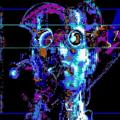Marek reviewed Microcosmos by Dorion Sagan
A compelling account of early microbial evolution and symbiosis, that gets let down by speculation in the second half.
4 stars
The first two thirds of this are a fascinating exploration of microbial evolution, including some fairly compelling descriptions of microbiology that supports the symbiotic account of major evolutionary leaps.
Evolutionary iconoclast and groundbreaker Lynn Margulis and her son Dorian Sagan explore the richness of microbiological life, which was all life for more than half the history of evolution, and which they argue really remains dominant to this day. Multicellular life, including the supposedly special human, is really an extension of microbial life - we emerge within the global medium of bacteria, protists, and archae, remain dependent upon it, and exist in a world that is largely maintained and regulated by the mass of the "microcosmos".
While they explore microbial evolution they present evidence and detail which is satisfying and persuasive (though as the book is pretty old at this point, some of this has been superseded). The chapters …
The first two thirds of this are a fascinating exploration of microbial evolution, including some fairly compelling descriptions of microbiology that supports the symbiotic account of major evolutionary leaps.
Evolutionary iconoclast and groundbreaker Lynn Margulis and her son Dorian Sagan explore the richness of microbiological life, which was all life for more than half the history of evolution, and which they argue really remains dominant to this day. Multicellular life, including the supposedly special human, is really an extension of microbial life - we emerge within the global medium of bacteria, protists, and archae, remain dependent upon it, and exist in a world that is largely maintained and regulated by the mass of the "microcosmos".
While they explore microbial evolution they present evidence and detail which is satisfying and persuasive (though as the book is pretty old at this point, some of this has been superseded). The chapters follow a general chronological sequence, meaning that in the later sections they get to multicellular life, and then on to humanity. This is where things start to get much less appealing.
The compelling story of symbiosis and intricate networks of chemistry and motility in the first two-thirds of the book are undermined by some very weak ‘just so’ stories on human evolution in the later sections. This particularly the case in the long chapter on human evolution, in which the microbiological is inexplicable shed entirely in favour of some quite expansive speculation on the development of faculties of cognition and language.
In the final chapter the book rallies a bit, with some discussion of the Gaia hypothesis, and how biological forces regulate physical and chemical processes on the planet, which reinforces the idea that really we are froth in the medium of microbial activity in the grand scheme of things. There is some rather careless (alas wildly optimistic) speculation about the future of expansion to other worlds which seems to ignore so much of the implications of the first half of the book it's confusing.
Overall, there's lots here to like, but you wouldn't miss much if you skipped the long chapter 11 entirely, and skim chapter 12 for the Gaia and Daisyworld stuff.
As a (quite different but I think interestingly diffractive) shot for this chaser, try: bookwyrm.social/book/972516/s/a-city-on-mars
Or perhaps more obviously: bookwyrm.social/book/210755/s/i-contain-multitudes

